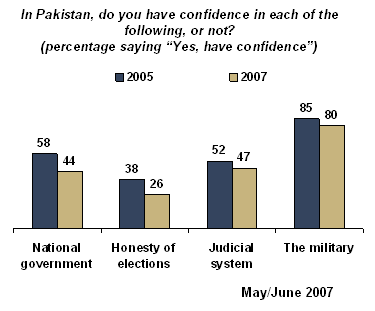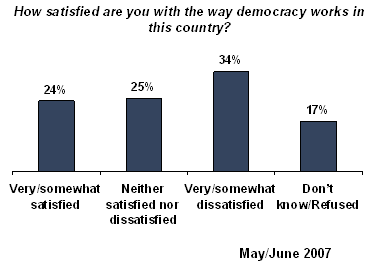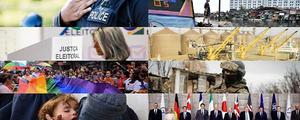GALLUP NEWS SERVICE
WASHINGTON, D.C. -- General Pervez Musharraf's bid for a re-election as Pakistan's president is generating a rising tide of protest in the country. A recent Gallup Poll conducted in May and June asked Pakistanis whether they approved of the job performance of their country's leadership; just 37% of Pakistanis said yes while 47% said no.
Supporters of Musharraf's opposition stormed Pakistan's Supreme Court building last Friday, where justices were reviewing petitions that challenged the president's eligibility for the Oct. 6 election, claiming he cannot do so without first giving up his role as military chief. Musharraf has said he would resign from his military post if re-elected, and has discussed a possible power-sharing deal with former Prime Minister Benazir Bhutto. Whether such concessions would do much to reverse a decline in public confidence still remains to be seen.
Within Pakistan, Musharraf's standing has been damaged by his attempt last March to fire the country's chief justice, a move that resulted in violent clashes between security forces and opposition political activists. Moreover, public confidence in Pakistan's government and electoral system has declined significantly since 2005. In the most recent poll, fewer than half of Pakistanis (44%) said they have confidence in the national government -- down from 58% two years ago. More strikingly, only about one-fourth (26%) reported having confidence in the honesty of elections in Pakistan, down from 38% in 2005. Confidence in the country's judicial system and military has waned as well, but only marginally.

Gallup also asked Pakistanis, "How satisfied are you with the way democracy works in this country?" About one-fourth (24%) said they were either very satisfied or somewhat satisfied, and another quarter (25%) said they were neither satisfied nor dissatisfied. On the other hand, one-third (34%) said they were either somewhat or very dissatisfied.

Any hope that next week's election will establish a new mandate and ease doubts about Pakistan's political process appears dim. Bhutto's party is seriously considering resigning from Parliament and boycotting the election if Musharraf is allowed to run while keeping his military post. Two other parties have similarly announced that they plan to resign in an attempt to rob the election of legitimacy.
Survey Methods
Results are based on face-to-face interviews with a representative sample of 1,500 residents of Pakistan, aged 15 and older, conducted May 24 - June 29, 2007. For results based on this sample, one can say with 95% confidence that the maximum margin of error attributable to sampling, weighting, and other random effects is ±2.8 percentage points. In addition to sampling error, question wording and practical difficulties in conducting surveys can introduce error or bias into the findings of public opinion polls.
